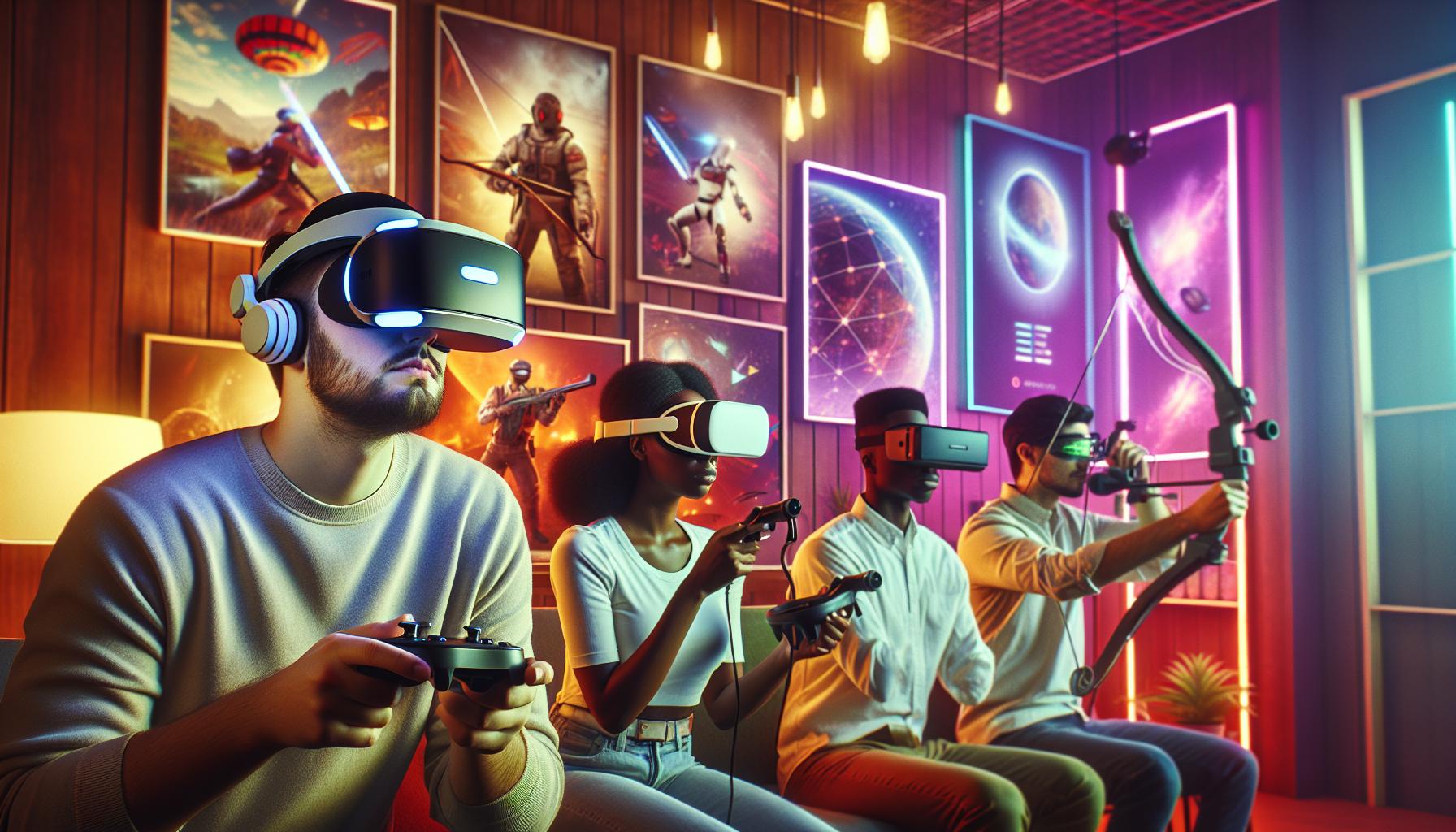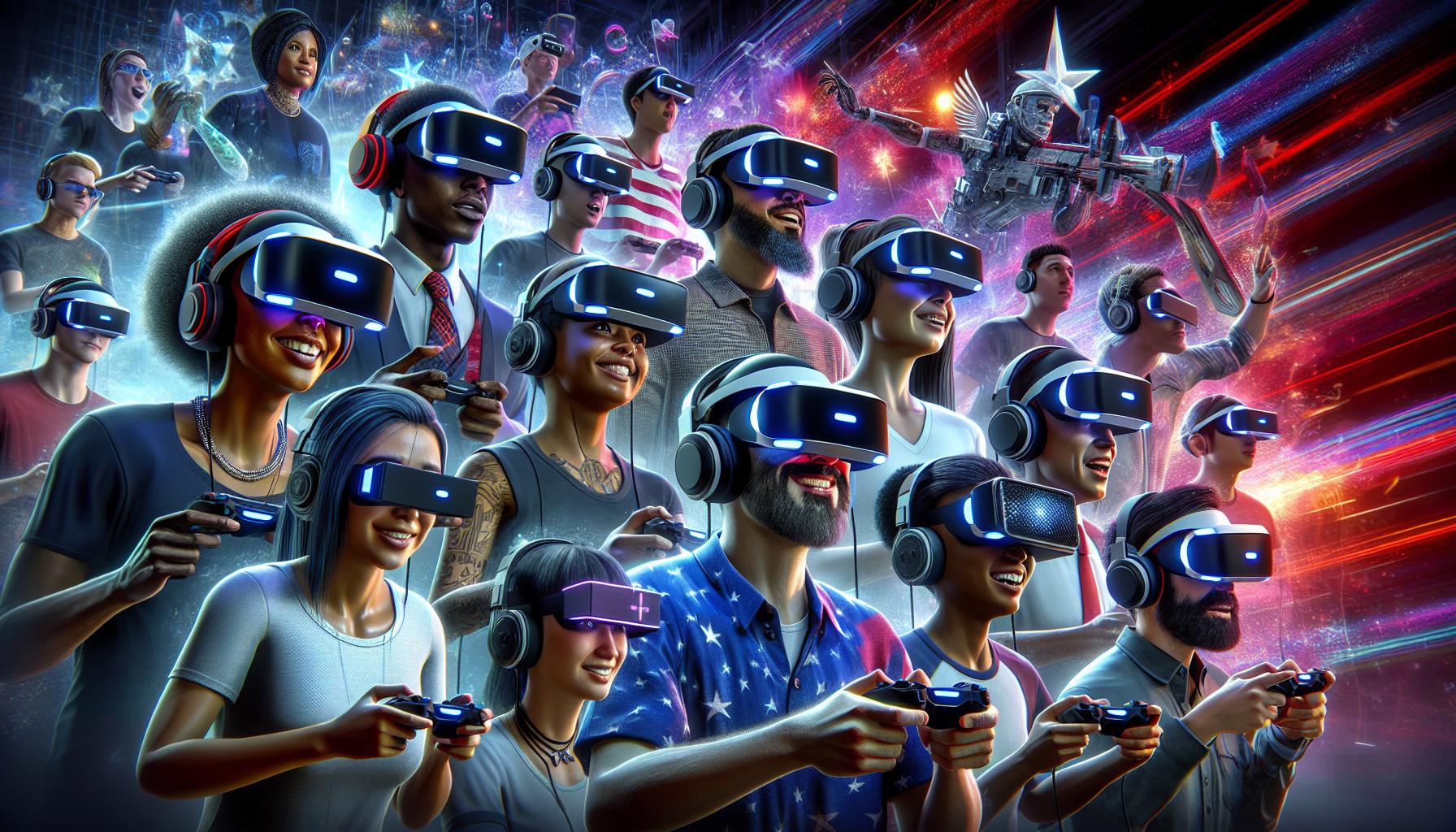Key Takeaways
- Immersive Gameplay: Virtual reality headset games provide a unique, immersive experience that transports players into 3D environments, enhancing engagement and interaction.
- Diverse Genres: The VR gaming landscape includes various genres, such as action, adventure, simulation, and puzzle games, catering to all player preferences and interests.
- Technological Advancements: Continued innovations in VR technology, including improved hardware and integration of features like haptic feedback, significantly enhance realism and player comfort.
- Social Connectivity: Multiplayer VR games enable real-time interaction with friends and communities, fostering collaboration and social experiences within virtual settings.
- Challenges to Overcome: Issues like motion sickness and accessibility limitations pose challenges for developers, necessitating ongoing improvements to ensure a comfortable and inclusive gaming experience.
- Future Growth Potential: The future of VR games looks promising, with expanding genres and increasing investment in technology expected to drive innovation and attract a broader audience.
Virtual reality headset games have transformed the gaming landscape, offering immersive experiences that transport players to entirely new worlds. With advancements in technology, these games are no longer just a novelty; they’ve become a staple for gamers seeking deeper engagement and interactive storytelling.
As players slip on their headsets, they find themselves in vibrant environments where they can explore, compete, and connect like never before. From thrilling action-adventures to serene explorations, the variety of VR games caters to every taste and preference. The excitement surrounding virtual reality continues to grow, making it an essential topic for both casual gamers and industry enthusiasts alike.
Virtual Reality Headset Games
Virtual reality headset games transform traditional gaming by immersing players in 3D environments. Players don headsets that provide expansive fields of view and 360-degree visuals, making gameplay authentic and engaging. The technology allows for physical interaction with virtual spaces, offering a unique blend of entertainment and realism.
Numerous genres cater to various interests:
- Action Games: Titles like “Beat Saber” challenge players with rhythm-based gameplay, requiring quick reflexes.
- Adventure Games: “The Walking Dead: Saints & Sinners” captivates players with rich storytelling and exploration elements.
- Simulation Games: “Job Simulator” showcases a humorous take on everyday tasks, providing lighthearted yet interactive experiences.
- Puzzle Games: “I Expect You To Die” engages players with mind-bending puzzles in a spy-themed scenario.
The growing library of VR games continues to attract diverse audiences, enhancing both casual and competitive gaming experiences. Major gaming platforms, such as Oculus Quest and PlayStation VR, enable easy access to these immersive worlds, expanding their reach and popularity. Game developers frequently innovate, integrating haptic feedback and motion tracking to improve player immersion.
Overall, virtual reality headset games redefine gamer interaction, pushing boundaries and creating experiences that resonate with modern entertainment demands.
Popular Virtual Reality Headset Games

Virtual reality headset games span various genres, attracting a wide audience. These immersive experiences captivate players and showcase the technology’s potential.
Action Games
Action games in virtual reality deliver intense experiences filled with adrenaline. Titles like “Beat Saber” and “Superhot VR” require quick reflexes and precision. “Beat Saber” combines rhythm and movement, making players slice through blocks to the beat of music. “Superhot VR” provides a unique twist with time manipulation, challenging players to outsmart enemies in slow motion. Other popular action games include “Boneworks” and “Pistol Whip,” each offering engaging mechanics and dynamic combat scenarios.
Adventure Games
Adventure games in VR create rich narrative experiences. “The Walking Dead: Saints & Sinners” immerses players in a post-apocalyptic world, where survival and choices significantly impact the story. “Lone Echo” features exploration in a sci-fi setting, allowing players to interact with environments and characters in a deeply immersive way. “No Man’s Sky” also offers an expansive universe, where players can explore planets and engage in space combat. These titles provide captivating stories and encourage exploration and creativity.
Simulation Games
Simulation games leverage VR’s capabilities to mimic real-world activities. “Job Simulator” allows players to experience various professions humorously, from cooking to office work. “Wreckfest” offers racing enthusiasts a realistic driving experience with vehicle damage physics. “The Forest” provides a survival simulation where players gather resources and build shelters in a wilderness setting. These games bridge the gap between reality and gaming, offering educational and entertaining experiences.
Benefits of Virtual Reality Headset Games

Virtual reality headset games offer distinct advantages that enhance the gaming experience. These benefits range from immersion to social connectivity, transforming how players engage with digital content.
Immersive Experience
Immersive experiences define virtual reality headset games. Players can step into 3D environments that replicate real-world settings or fantastical landscapes. This depth of immersion simulates a sense of presence, making players feel as though they’re truly part of the game. Technologies like haptic feedback and motion tracking enhance realism, as users can physically interact with the virtual world. Consequently, players enjoy unique gameplay experiences that foster deeper emotional connections to the game’s narrative and environment.
Social Interaction
Social interaction is another significant benefit of virtual reality headset games. Multiplayer functionalities allow players to engage with friends and others in real-time, regardless of their physical locations. Virtual reality platforms like VRChat and Rec Room encourage communities to form, socialize, and partake in shared experiences. With voice chat and avatars, users can express themselves in environments that blur the lines between reality and the virtual world. Through cooperative challenges or competitive games, players build teamwork and camaraderie, enhancing the overall gaming experience.
Challenges of Virtual Reality Headset Games

Virtual reality (VR) headset games face several challenges that can impact player experiences and broader adoption. Addressing these issues is essential for the ongoing evolution of VR technology.
Motion Sickness
Motion sickness is a prevalent challenge in VR gaming. Many players report symptoms like dizziness, nausea, and disorientation due to the disconnect between visual input and physical movement. Factors contributing to motion sickness include low frame rates, excessive latency, and rapid in-game movements. Developers often mitigate these effects by optimizing game performance, implementing teleportation for movement, and allowing customizable comfort settings. Games like “Beat Saber” and “Astro Bot Rescue Mission” incorporate these approaches to enhance player comfort.
Accessibility Issues
Accessibility issues present another challenge in VR headset gaming. Not all players can engage fully with VR experiences due to physical limitations or disabilities. Controllers designed for standard use may not accommodate players with limited mobility or other challenges. Developers can improve accessibility by incorporating various control schemes, offering options for one-handed gameplay, or integrating eye-tracking technology. Games that prioritize inclusivity, such as “Moss” and “Half-Life: Alyx,” set a positive precedent by making gameplay more accessible for a wider array of players.
Future of Virtual Reality Headset Games
The future of virtual reality headset games shows immense potential for growth and innovation. Advances in technology continue to enhance the gaming experience, with improved graphics, processing power, and display resolutions. Developers focus on creating more immersive environments, allowing players to engage with virtual worlds on deeper levels.
Innovations in hardware, such as lighter headsets with better battery life and increased field of view, drive greater user adoption. Manufacturers like Meta, HTC, and Sony lead the charge in refining VR headsets. Upcoming models promise robust features aimed at delivering seamless experiences.
Diverse genres will expand within the VR ecosystem. Emerging genres, including educational and training simulations, will gain traction alongside traditional gaming. Titles like “Tilt Brush” and “VR Chat” already illustrate how VR can merge creativity with interactivity. Educational platforms utilizing VR for learning purposes further diversify the market.
Social gaming experiences are expected to evolve significantly. Virtual spaces will offer broader social interactions, fostering communities beyond gaming. Platforms like VRChat will integrate more real-time collaboration features for networking events and educational workshops. Gamers can expect richer multiplayer functionalities, enhancing shared experiences.
Addressing challenges like motion sickness and accessibility remains a priority. Game developers will implement advanced techniques to mitigate motion-related discomfort, such as adaptive comfort settings. Solutions tailored for users with disabilities will enhance inclusivity, encouraging a wider audience.
The gaming industry anticipates increased investment in VR technologies from both independent and major studios. Budding developers are entering the market, bringing fresh perspectives and innovative concepts. Growth in consumer interest will fuel a more diverse range of titles, captivating users.
Overall, the trajectory of virtual reality headset games shapes an exciting landscape. Technological advancements, genre diversification, enhanced social connectivity, and a focus on inclusivity will redefine gaming experiences in the coming years.
Reshaping The Gaming Landscape
Virtual reality headset games are not just a passing trend; they’re reshaping the gaming landscape. With immersive experiences that engage players on multiple levels, these games offer a unique blend of entertainment and realism. The variety of genres ensures that every player can find something that resonates with their interests.
As technology continues to advance, the potential for VR games will only grow. Developers are committed to overcoming challenges like motion sickness and accessibility, paving the way for a more inclusive gaming environment. The future promises exciting innovations and deeper social connections within virtual spaces, making VR a vital part of the gaming experience for years to come.